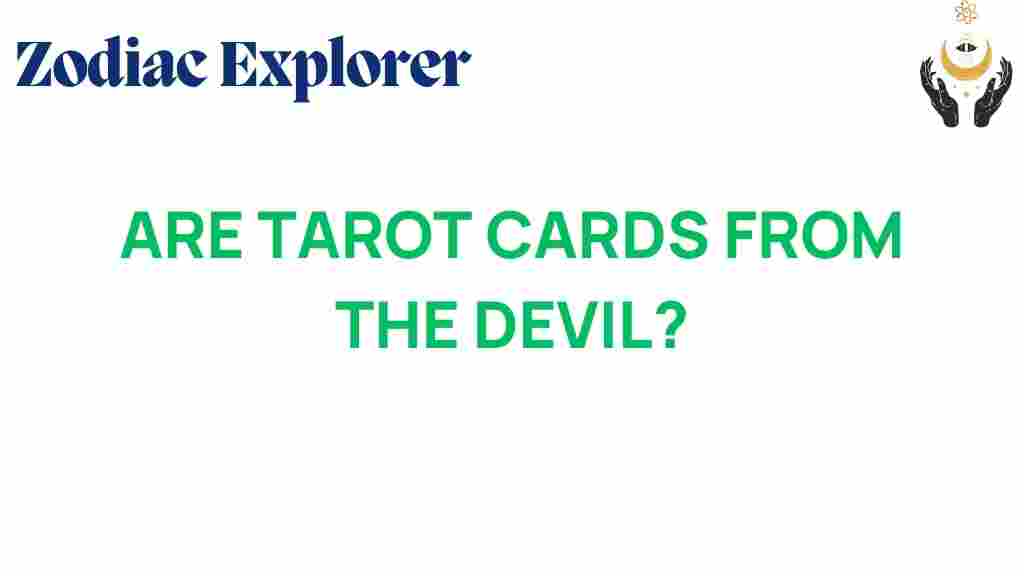Are Tarot Cards a Gateway to the Devil’s Realm?
Tarot cards have long been a topic of fascination and controversy. Some view them as a powerful tool for divination and self-discovery, while others regard them as an entry point to the occult and potentially the Devil’s realm. This article will delve into the complex relationship between tarot cards, spirituality, and the various beliefs surrounding them. We will explore their historical context, psychological implications, and the myths that perpetuate the notion of tarot as a dangerous practice.
The Historical Background of Tarot Cards
Tarot cards originated in the mid-15th century in Europe as playing cards. Their transformation into a tool for fortune-telling and spirituality began in the late 18th century. Influenced by the occult revival, tarot became associated with mystical practices and superstitions. Today, tarot is used for various purposes, from personal reflection to professional readings.
Understanding the Tarot Deck
A standard tarot deck comprises 78 cards, divided into two main sections: the Major Arcana and the Minor Arcana. Each card is rich in symbolism and meaning, often drawing from various mythologies and psychological archetypes. Here’s a brief overview:
- Major Arcana: 22 cards that represent significant life events and spiritual lessons.
- Minor Arcana: 56 cards divided into four suits (Cups, Pentacles, Swords, and Wands) that reflect everyday situations and experiences.
The Role of Tarot Cards in Spirituality
Many practitioners view tarot cards as a means of connecting with their spirituality. The act of reading tarot can serve as a meditative practice, allowing individuals to tap into their intuition and subconscious mind. Here are some of the benefits:
- Self-Reflection: Tarot encourages personal insight and introspection.
- Guidance: Many seek tarot readings for direction in life’s challenges.
- Connection: Tarot can help individuals feel connected to the larger universe.
Debunking Myths: Are Tarot Cards Evil?
Despite their popularity, tarot cards often face scrutiny and are sometimes labeled as tools of the occult. Critics argue that using tarot cards is a form of superstition that can lead to dangerous beliefs. Let’s explore these myths:
- Myth 1: Tarot cards summon demons or evil spirits.
- Myth 2: Practicing tarot leads to a loss of control over one’s life.
- Myth 3: Tarot readings are only for those who dabble in dark magic.
These myths stem from a misunderstanding of tarot’s purpose. Many tarot practitioners do not believe in the supernatural aspects often associated with the cards. Instead, they see tarot as a tool for psychology and emotional exploration.
Psychological Perspective on Tarot Reading
From a psychological viewpoint, tarot readings can be seen as a form of storytelling. The cards provide a framework for individuals to narrate their experiences and emotions. This process can have several psychological benefits:
- Projection: Individuals project their feelings onto the cards, allowing for deeper understanding.
- Symbolism: The rich symbolism in tarot can trigger personal insights and epiphanies.
- Empowerment: Tarot can empower individuals to take charge of their narratives.
How to Conduct a Tarot Reading
If you’re curious about tarot cards and want to explore your own readings, follow these steps:
- Choose Your Deck: Select a tarot deck that resonates with you.
- Create a Sacred Space: Find a quiet location where you can focus.
- Set Your Intention: Decide on a question or area of your life you want to explore.
- Shuffle the Cards: While shuffling, concentrate on your question.
- Draw Cards: Choose a spread (like the three-card spread) and lay the cards out.
- Interpret the Cards: Use your intuition and the meanings of the cards to explore your situation.
Troubleshooting Common Concerns
Many newcomers to tarot may experience anxiety or skepticism. Here are some tips to alleviate these concerns:
- Trust Your Intuition: Remember, tarot is a personal journey; trust your instincts.
- Educate Yourself: Read books and resources about tarot to gain a stronger understanding.
- Practice Regularly: The more you practice, the more comfortable you will become.
Spirituality vs. Superstition
Both spirituality and superstition can influence how people perceive tarot. It’s essential to distinguish between the two:
- Spirituality: Involves personal beliefs, practices, and experiences—often empowering and enriching.
- Superstition: Relies on irrational beliefs that something can influence outcomes without a logical basis.
Understanding this distinction can help individuals approach tarot with an open mind rather than fear.
Connecting Tarot to Mythology
Many tarot cards draw inspiration from various mythologies. This connection enhances the depth of interpretations. For example:
- The Fool: Represents new beginnings, akin to the hero’s journey in mythology.
- The High Priestess: Embodies intuition and mystery, similar to numerous goddess figures in myth.
- The Tower: Symbolizes upheaval, reminiscent of mythological tales of destruction and rebirth.
By exploring these mythological connections, tarot users can enrich their readings and gain a deeper understanding of their personal journeys.
Conclusion: Tarot Cards as a Tool for Self-Discovery
In conclusion, tarot cards should not be viewed as a gateway to the Devil’s realm, but rather as a valuable tool for spirituality and self-discovery. While some may hold onto superstitions regarding tarot, it is essential to approach it with an open mind and a focus on personal growth.
Whether you are drawn to tarot for divination, psychological exploration, or simply curiosity, understanding its history and purpose can enhance your experience. Remember, tarot is not about predicting the future; it’s about reflecting on the present and navigating your path with intention.
If you’d like to learn more about tarot, consider exploring resources such as this guide to tarot basics. For further exploration into the psychological aspects of tarot, you might find this article on psychology and tarot insightful.
This article is in the category Myths and created by ZodiacExplorer Team
